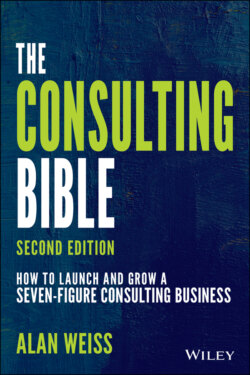Читать книгу The Consulting Bible - Alan Weiss - Страница 13
Various Forms
ОглавлениеEveryone today is a consultant. There is no barrier to entry, which is the blessing and the curse. When I wrote Million Dollar Consulting in 1991, I found that a palm reader on the boardwalk of Atlantic City has to pass more tests and conform to more regulations than any independent consultant. (I found that she has since retired, having sent her kids to college.) I would bet that's still true today, though no one claims to be a palm reader in an attempt to cover up that they're in fact between jobs, as the actors like to say.
Let me create a fundamental schism right here:
A consultant is someone who improves the client's condition by providing skills, behaviors, content, advice, experiences, and other factors unique to that individual over a designated time. The consultant is a peer of the buyer and creates assignment parameters in consultation and agreement with the buyer. The consultant provides conceptual capital, often in the form of intellectual property. Outstanding consultants charge fees based on value.
A contractor or subcontractor is someone who performs work for the buyer at the buyer's direction and discretion, acting as a temporary employee, helping to implement work assigned by the client. A contractor is, in fact, a temporary employee, and is almost always paid by the time unit, usually hourly. They are peers of other, internal implementers. They bring no unique intellectual capital in most cases, nor is that what the buyer is paying for.
Many of you are having a case of the vapors or have gone to have a shot of Scotch, and I hope it's the aged stuff. But that's my story and I'm sticking to it. A consultant is a “brain,” a subcontractor is another “pair of hands.”
As some of you are thinking, many people calling themselves consultants simply are not. My educated guess over the past 30 years of good economies and bad ones is that there are only half as many true consultants as are claimed.6 If we eliminate those between jobs just claiming to be consultants to save face, and those who are really subcontractors who are not sharing consulting DNA, we may have about 200,000 consultants in the United States, and perhaps twice that number globally.
And I believe only about 50 percent are sustaining decent lifestyles without additional support (their spouse's income, the oil well in the back yard, Aunt Tillie's bequest), and perhaps 20 percent are making high six‐figure and seven‐figure incomes. But that's a story for later in the book.
You may also have noticed, to your horror, that perhaps 90 percent of people calling themselves information technology (IT) consultants are, in reality, just paid help without the benefits.
